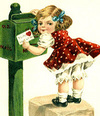Heritage German Roadmap
Heritage German Home
with links to my other websites
Webmaster's Bio
Meet Traute Klein,
AKA biogardener.
Heritage German Guestbook
Please Sign
or Read Entries
Subscription
To receive the occasional newsletter about this site, click on the email graphic and send me a note.

|
Luther, the Creator of a Language
by Traute Klein, AKA biogardener
 The language which unites German-speaking people around the world was created by an ex-priest, scholar, musician, poet. In his Bible translation, he transformed the language of bureaucracy into the down-to-earth poetry of the common people. The language which unites German-speaking people around the world was created by an ex-priest, scholar, musician, poet. In his Bible translation, he transformed the language of bureaucracy into the down-to-earth poetry of the common people.
When Martin Luther undertook to translate the Bible into German, he faced a far greater challenge than any other Bible translators of the Reformation era, because Germany did not have a unified language as did other European countries. England, France, and Italy, for example, each had a center of government and culture from where a common language was developed. Germany did not exist as a political unit until the many principalities joined against the threat of the Napoleonic invasion, but that event lay 300 years in the future.
 If the Bible was to be understood by all Germans, Luther had to create a language capable of touching the hearts of all. The spoken language of the people varied from principality to principality and even from town to town. If the Bible was to be read by all Germans, Luther had to create a language capable of touching the hearts of all. If the Bible was to be understood by all Germans, Luther had to create a language capable of touching the hearts of all. The spoken language of the people varied from principality to principality and even from town to town. If the Bible was to be read by all Germans, Luther had to create a language capable of touching the hearts of all.
 The 15th century "Kanzleisprache" was the language of bureaucracy. It was known as an efficient written language, and it became the starting point for Luther's Bible language. He, however, was not satisfied with the dry, stilted language of government officials. He was a poet who, in his own words, "sah dem Volk auf's Maul" (took the words out of the mouths of the common people). He was well versed in popular idioms and proverbs and incorporated them into his text. The Hebrew text of the Old Testament is richly interwoven with proverbs and down-to-earth everyday speech. Luther recreated that same atmosphere in his translation, a feat which no other Bible translator has been able to accomplish before or since. No other translation in the world can boast such a richness of popular expressions taken right out of the mouths of the common people, and as a result, no other Bible has experienced such instant acceptance. As a result, people all over the German-speaking world learned the language of the Luther-Bibel, and it became the foundation of the modern German language which is spoken and understood not only in German-speaking countries but around the world. The 15th century "Kanzleisprache" was the language of bureaucracy. It was known as an efficient written language, and it became the starting point for Luther's Bible language. He, however, was not satisfied with the dry, stilted language of government officials. He was a poet who, in his own words, "sah dem Volk auf's Maul" (took the words out of the mouths of the common people). He was well versed in popular idioms and proverbs and incorporated them into his text. The Hebrew text of the Old Testament is richly interwoven with proverbs and down-to-earth everyday speech. Luther recreated that same atmosphere in his translation, a feat which no other Bible translator has been able to accomplish before or since. No other translation in the world can boast such a richness of popular expressions taken right out of the mouths of the common people, and as a result, no other Bible has experienced such instant acceptance. As a result, people all over the German-speaking world learned the language of the Luther-Bibel, and it became the foundation of the modern German language which is spoken and understood not only in German-speaking countries but around the world.

Where other countries created a common language in centuries, Luther did it almost single-handedly in a few years.
Heritage Language Poll

|



 The language which unites German-speaking people around the world was created by an ex-priest, scholar, musician, poet. In his Bible translation, he transformed the language of bureaucracy into the down-to-earth poetry of the common people.
The language which unites German-speaking people around the world was created by an ex-priest, scholar, musician, poet. In his Bible translation, he transformed the language of bureaucracy into the down-to-earth poetry of the common people.